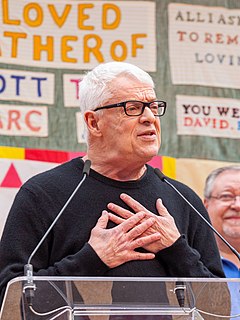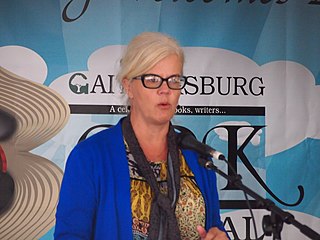A Quote by Cleve Jones
I go back to the parallels with 1963, 1964 when white America really became aware of the brutality of segregation, the cruelty of the apartheid system which existed in the south. Then white people began to get on the freedom buses and travel to the south and be part of the voter registration drives and they... some of them were beaten and some of them were murdered but they stood with the African-American community and the civil rights movement. It's time for straight people to do that today and it is time for gay people to insist that they do that today.
Quote Topics
African
African-American
African-American Community
America
American
Apartheid
Aware
Back
Beaten
Became
Began
Brutality
Buses
Civil
Civil Rights
Civil Rights Movement
Community
Cruelty
Drives
Existed
Freedom
Gay
Gay People
Get
Go
Insist
Movement
Parallels
Part
People
Really
Registration
Rights
Rights Movement
Segregation
Some
South
Stood
Straight
Straight People
System
Them
Then
Time
Today
Travel
Voter
Voter Registration
Were
Which
White
Related Quotes
In the South, prior to the Civil Rights movement and the 1964 Civil Rights Act, democracy was the rule. The majority of people were white, and the white majority had little or no respect for any rights which the black minority had relative to property, or even to their own lives. The majority - the mob and occasionally the lynch mob - ruled.
If all the white people who claim they don't hate us would ever get together and do something to the whites who claim they hate us, we'd see some action. Talk is cheap, if white people didn't want to have a South African situation ... there'd be none. If white people in America didn't want segregation, there'd be none ... it is the man who allows him to lynch who is never seen.
[Before the Civil Rights Act of 1964], many governments in southern states forced people to segregate by race. Civil rights advocates fought to repeal these state laws, but failed. So they appealed to the federal government, which responded with the Civil Rights Act of 1964. But this federal law didn't simply repeal state laws compelling segregation. It also prohibited voluntary segregation. What had been mandatory became forbidden. Neither before nor after the Civil Rights Act were people free to make their own decisions about who they associated with.
At the beginning of the 20th century, before the migration began, 90 percent of all African-Americans were living in the South. By the end of the Great Migration, nearly half of them were living outside the South in the great cities of the North and West. So when this migration began, you had a really small number of people who were living in the North and they were surviving as porters or domestics or preachers - some had risen to levels of professional jobs - but they were, in some ways, protected because they were so small.
There was a resistance movement in the white community, and there was a determined civil rights movement by our neighbors and friends in the African-American community. They had right on their side. They conducted themselves in high standards, with courage and determination, and they were victorious. They overcame.
All of you are aware of the tragic history of racism in America, but for a very long time, African-Americans and their white allies came together and they struggled and they stood up for justice and they stood up to lynching and they stood up to segregation and the stood up to a nation where African-Americans couldn't even vote in America.
For many years now, I have been an outspoken supporter of civil and human rights for gay and lesbian people. Gays and lesbians stood up for civil rights in Montgomery, Selma, in Albany, Ga. and St. Augustine, Fla., and many other campaigns of the Civil Rights Movement. Many of these courageous men and women were fighting for my freedom at a time when they could find few voices for their own, and I salute their contributions.
So many white people don't want to talk about race; it's uncomfortable. Many reason that slavery happened more than a century ago, and people alive today had nothing to do with it. But the particulars of these stories, from slavery to segregation to civil rights and mass incarceration, are at the marrow of life in America today.
The gay rights movement of recent years has been an inspiring victory for humanity and it is in the tradition of the civil rights movement when I was a young boy in the South, the women's suffrage movement when my mother was a young woman in Tennessee, the abolition movement much farther back, and the anti-apartheid movement when I was in the House of Representatives. All of these movements have one thing in common: the opposition to progress was rooted in an outdated understanding of morality.
South Africa, with US support, after the fall of the Portuguese empire, invaded Angola and Mozambique to establish their own puppet regime there. They were trying to protect Namibia, to protect apartheid, and nobody did much about it; but the Cubans sent forces, and furthermore they sent black soldiers and they defeated a white mercenary army, which not only rescued Angola but it sent a shock throughout the continent-it was a psychic shock-white mercenaries were purported to be invincible, and a black army defeated them and sent them back fleeing into South Africa.
When the nuclear weapons were sent to the racist South African government, where a few million white people subjugated more than 13 million black people, it was so they could use them against the Cuban forces that were defending Angola. These things have not been written down but they need to be told as part of the reality of history which should not be distorted the way the historians connected to the power elite tend to do.


































